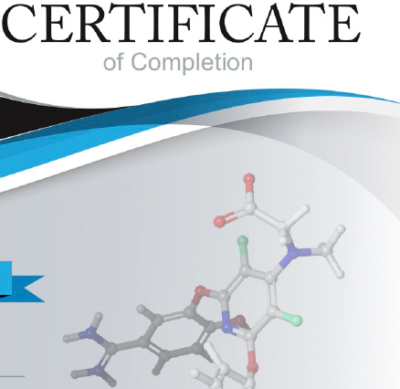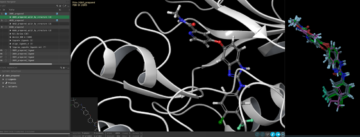Support for molecular modeling enriches PhD experience

Molecular modeling software is used by pharmaceutical companies, biotech firms, and academic researchers to simulate and model the behavior of molecules at the atomic level. This accelerates design and development of new drugs and materials more efficiently, reducing the time and cost of bringing them to market. Gaining experiential skills in these techniques can accelerate doctoral student understanding of the practical applications of their research in many sectors. Responding to student needs, Careers Beyond Academia supported training for several participants to gain these skills through online modules created by industry experts at Schrodinger.
Comprised of seven modules, the self-paced course took ~25 hours to complete, for those new to computational modeling. From applying molecular modeling to drug discovery, participants created computational molecules using Maestro, viewed protein-ligand interactions to identify and optimize poses for hit identification, conducted virtual high throughput screens using tips on computational drug design, and then combined modeling and experimental data for collaborative drug discovery. The course ended with a case study on VEGFR2 kinase inhibitors.

Careers Beyond Academia has supported three doctoral students to learn how to conduct molecular modeling for drug discovery. Here they share feedback on what they learned:
“The online course from Schrodinger, Introduction to Molecular Modeling for Drug Discovery, gave me an appreciation for the vast chemical space that can be explored using computational methods before performing more costly biochemical experiments. The course complemented my background in protein structure determination by demonstrating how the information gained from a high quality protein structure can give valuable insight into the development of small molecule inhibitors used to treat diseases. I would recommend this course to anyone interested in pursuing a career in developing novel treatments for diseases, especially if they are interested in using a structure guided approach.” – C. Aplin, PhD’23 Biophysics
“This course is an excellent introduction to molecular modeling in drug discovery, which is incredibly useful for any student considering the biotech/pharmaceutical industry. The course is suitable for any level of knowledge in the drug discovery or molecular modeling, since the course is designed to introduce a wide range of concepts with great care taken in making sure the participants understand and practice them. I felt that I was able to get a grasp of what the process is like in the drug development industry, which helped affirm my interest in the field. In addition, the course allowed an invaluable chance for participants to complete an independent project of designing a new molecule, with detailed instructions along the way.” – T. Nguyen, PhD’22 Chemistry and Chemical Biology
“As a participant in the Schrodinger drug discovery course, my experience was deeply enriching and insightful. The course provided a comprehensive overview of the drug development process, emphasizing the role of computational tools in modern pharmaceutical research. It offered a hands-on learning experience that bridged the gap between theoretical knowledge and practical application. Throughout the course, we delved into various aspects of drug discovery, including target identification, lead optimization, and docking prediction. One of the highlights was using Schrodinger’s suite to model molecular interactions, which gave me a better understanding of how drugs interact with biological systems at a molecular level. This course enhanced my technical skills and broadened my understanding of the complexities and potential of drug discovery in today’s world. It’s an invaluable experience for anyone interested in the intersection of technology and healthcare.” – B. Shaw, Biophysics


